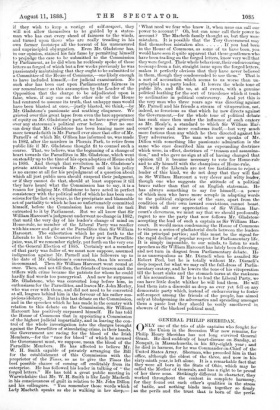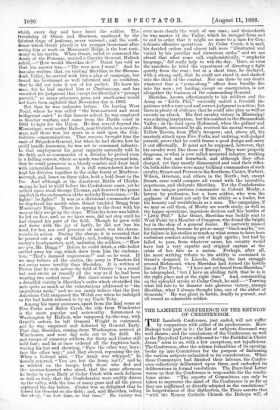GENERAL PHILIP SHERIDAN.
ONLY one of the trio of able captains who fought for the Union in the Secession War now remains, for Philip Henry Sheridan has not long survived General Grant. He died suddenly of heart-disease on Sunday, at Nonquit, in Massachusetts, in his fifty-eighth year ; and he died in harness, for he was Commander-in-Chief of the United States Army. Sherman, who preceded him in that office, although the eldest of the three, and now in his- sixty-ninth year, is left alone. It is a remarkable fact that they were all born in the State of Ohio, which may be called the Mother of Generals, and has a right to be proud of her three sons. Strikingly different in character, they worked throughout the contest in complete harmony, for they found out each other's qualities in the stress of battle, and nothing binds men together so firmly as the perils and the trust that is born of the perils which every day and hour beset the soldier. The friendship of Grant and Sherman, unalloyed by the faintest tinge of jealousy, never wavered ; and the confi- dence which Grant placed in his younger lieutenant after seeing him at work on Missionary Ridge, is the best testi- mony to his merits. When Grant, called to command the Army of the Potomac, wanted a Cavalry General, Halleck asked,—" How would Sheridan do ?" Grant has told us that his answer was,—" The very man I want." And he has also written that, on visiting Sheridan in the Shenan- doah Valley, he carried with him a plan of campaign, but found his lieutenant so well informed and so confident, that he did not take it out of his pocket. He knew his man, for he had marked him at Chattanooga, and has recorded his judgment that, except for Sheridan's " prompt pursuit," so many prisoners, guns, and small-arms would not'have been captured that November day in 1863. Not that he was unknown before. On leaving West Point, where he was called " the best-natured and most belligerent cadet " in that famous school, he was employed in frontier warfare, and came from the Pacific coast in 1861 to fight for the Union. He first served beyond the Mississippi ; next under Halleck, near Corinth, as a cavalry- man; and there won his spurs in a raid upon the Con- federate communications. That success brought him the rank of Brigadier-General, but when he had shown how he could handle horsemen, he was set to command infantry. In that employment his great capacity naturally told in the field, and as commander of a division he proved even in a failing contest, where so much was falling around him, that be could persevere in a bloody combat and draw back with untarnished honour. It is still remembered how he kept his division together in the cedar forest at Murfrees- borough, and, beset on three sides, held a bold front to the foe. And although at the disastrous Battle of Chicha, ma,uga he had to yield before the Confederate onset, yet he rallied upon stout George Thomas, and deserved the praise implied in the exclamation of the unlucky Rosencrans,—" He fights ! he fights !" It was as a divisional commander that he displayed his mettle when Grant tumbled Bragg from Missionary Ridge. There he sprang to the front with his men as they swept up the slope. When his horse was killed, he led on foot, and, as we have seen, did not stop until he had cleared his part of the field. Though he grew wild and- fierce with the joy of battle, he did not lose his bead, for hot, not cool presence of mind, was his charac- teristic in action. During the charge, it is recorded that he poured out a cup of whisky, and, looking towards the enemy's headquarters, said, imitating the soldiers,—" How are you, Mr. Bragg ?" Before he could drink, a rifle-bullet carried away his cup, which drew from him the exclama- tion, " That's damned ungenerous !" and on he went. If we may believe all the stories, the army in Flanders did not swear more terribly than Sheridan. It is written of Piston• that he rode across the field of Vitoria " in a round hat, and swore as roundly all the way as if he had been -wearing two cocked ones." But there seems to have been a dreadful variety in Sheridan's oaths which electrified the men quite as much as the exhortations addressed to " the impenitent mule," and we can easily believe that the fiery American Celt surpassed the Welsh one when he indulged in the bad habit referred to by my Uncle Toby. Among his many successes, apart from the final scene at Five Forks and Sailor Creek, the ride from Winchester is the most popular and noteworthy. Summoned to Washington by Halleck, who tampered, by-the-way, with Grant's orders, he left General Wright in command, and he was surprised and defeated by General Early. That day, Sheridan, coming from Washington, arrived at Winchester, and next day rode out to the field. He met troops of runaway soldiers, for Getty and Custer still held fast; and he at once ordered all the fugitives back, waving his hat and shouting, " Face the other way, boys ; face the other way;" and they obeyed, repeating the cry. When' a Colonel said, " The Army was whipped," he fiercely retorted, " You are, but the Army isn't ;" and he so 'worked on the troops, both those who fled and the • stouter-hearted who stood, that the same afternoon he broke in upon Early at Cedar Creek with such deftness as well as fury, that the Confederates were swiftly driven up the valley, with the loss of many guns and all the pieces captured the day before. Custer was so delighted that he kissed his General on the field ; and, said Sheridan, telling the • st ry, " so lost time, so lost time." No victory was ever more clearly the work of one man; and thenceforth he was master of the Valley, which he ravaged from end to end in order that it might no more be a base for Con- federate offensive operations. At Cedar Creek, it is said, his decided orders and cheery talk were "illustrated and varied by his peculiar and numerous oaths," and we are afraid that what some call, euphemistically, " emphatic language," did really help to win the day. Once, so runs the anecdote, he tried the experiment of directing a fight quietly from the rear ; but in a short time, he declared, with a strong oath, that he could not stand it, and dashed into the thick of the combat. Nor can there be any doubt whatever that a " come-along " officer does breathe fire into his men ; yet leading, except on emergencies, is not altogether the business of the commanding General.
Sheridan, known affectionately to his soldiers and the Army as " Little Phil," curiously united a feverish im- patience with a very cool and correct judgment in action; but there is plenty of evidence that he could also plan as well as execute an attack. His first cavalry victory in Mississippi was a daring inspiration; but his conduct in the Shenandoah Valley; in the raid upon Richmond, when the gallant and able Stuart, lamented by all, received his mortal wound, at Yellow Tavern, from Phil's troopers ; and, above all, his masterly attack upon Five Forks, and untiring, well-judged pursuit, prove that he could frame a good design and carry it out effectually. It must not be supposed, however, that his cavalry were like those of Europe. They were properly dragoons, or what is now called mounted infantry, working alike on foot and horseback, and although they often charged, yet they mostly dismounted and used their rifles. On both sides there were many brilliant commanders of such cavalry, Stuart and Forrest in the Southern, Custer, Torbert, Wilson, Grierson, and others in the North ; but, except Stuart, none could compare all round with the inventive, impetuous, and obdurate Sheridan. Yet the Confederates had one unique partisan commander in Colonel Mosby, a lawyer by profession, but a born soldier, who won the applause of Grant not only for his ability as a leader, but his honesty and truthfulness as a man The campaigns, if we may so call them, of Mosby are worth study, as well as the larger operations, ingenious devices, and fine battles of " Little Phil." Like Grant, Sheridan was luckily sent to West Point by a Member of Congress, who found the bright boy in the shop of a general dealer. He narrowly missed his commission, because he got so many " black marks," not for failure in his studies so much as what seems to have been turbulent conduct arising out of high spirits ; but had he failed to pass, from whatever cause, his country would have lost a very capable and original captain at the crisis of her fate as a nation. Perhaps, after all, the most* striking tribute to his ability is contained in Grant's despatch to Lincoln, during the last struggle around Richmond, when Sheridan had turned the hostile line at Five Forks. " I have not yet heard from Sheridan," he telegraphed, " but I have an abiding faith that he is in the right place and at the right time." And, commenting on the splendid stroke at Cedar Creek, he said :—" Turning what bid fair to be disaster into glorious victory, stamps Sheridan, what I always thought him, one of the ablest of Generals." He was great in battle, deadly in pursuit, and all round an admirable soldier.



































 Previous page
Previous page